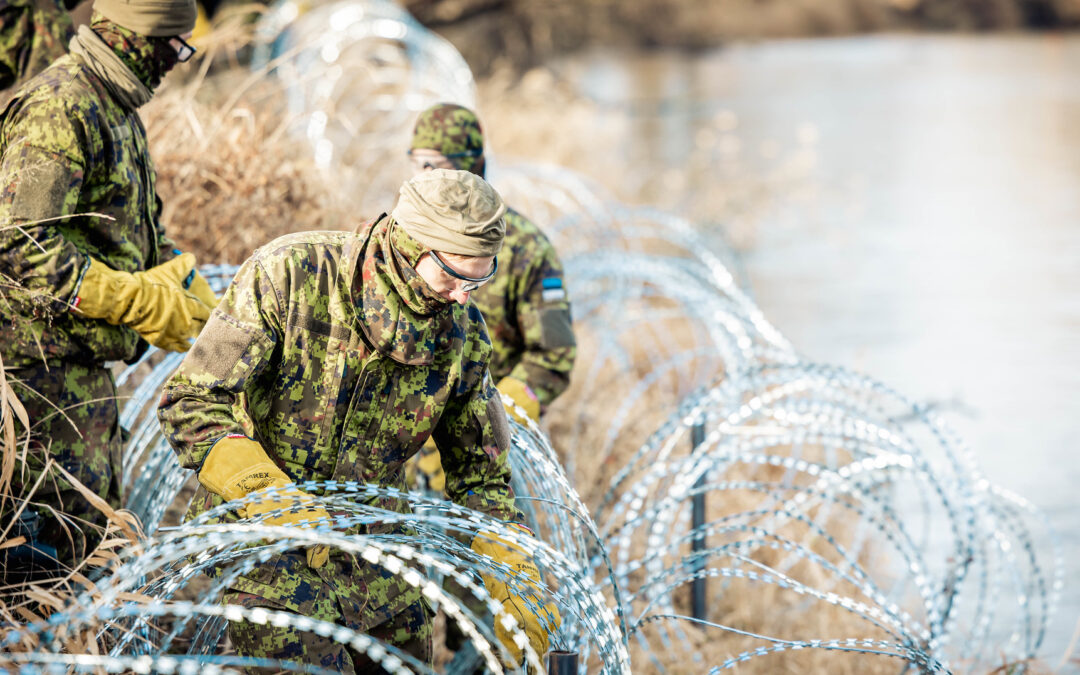Poland has announced the arrival of a group of 140 British soldiers who will assist Polish troops in repairing and strengthening a temporary fence set up amid increased migration pressure on the border with Belarus.
Poland recently also welcomed 100 Estonian troops equipped with drones. The Czech Republic has, however, suspended plans to deploy soldiers to Poland, saying that the situation on the border has “stabilised”.
Kolejna grupa żołnierzy brytyjskich wylądowała dziś w Polsce. Będą oni pomagać żołnierzom #WojskoPolskie m. in. w naprawie i budowie tymczasowego ogrodzenia na granicy 🇵🇱 – 🇧🇾. Wspólna odpowiedź na zagrożenia hybrydowe to wyraz naszej sojuszniczej solidarności. pic.twitter.com/jjCzNvF2k1
— Mariusz Błaszczak (@mblaszczak) December 13, 2021
The latest British deployment – made up of specialists from the Royal Engineers – is the second to arrive in Poland, following a reconnaissance unit that came on 11 November.
“This non-combat support will assist Polish efforts to protect their border and pass on vital engineering expertise,” said Defence Secretary Ben Wallace.
The specialists will “support Polish troops with specific engineering tasks along the border including infrastructure support and repairing access roads, as well as planning support”, added a defence ministry statement. They will remain until April
The UK has also deployed a reconnaissance team to Lithuania, which has faced similar pressures on its border with Belarus, to “explore whether the UK can provide support”.
140 Royal Engineers are deploying to Poland to provide specialist support in response to pressures from irregular migration at the Belarus border.
Personnel will support Polish troops with planning and specific engineering tasks.
More info: https://t.co/8ocdVurSUY pic.twitter.com/AViSX63Ynv
— Ministry of Defence 🇬🇧 (@DefenceHQ) December 11, 2021
Poland’s defence minister, Mariusz Błaszczak, welcomed the UK deployment, describing it as an “expression of solidarity” as Poland faces “hybrid threats”. Last month, over 100 Estonian soldiers and specialist drone units were also deployed to Poland.
Last week, the Czech government also approved plans to send up to 150 soldiers to support Poland on its border with Belarus. This week, however, it announced that it was suspending the mission.
“The planned deployment of Czech soldiers to Poland is not necessary yet because the situation on the border with Belarus has been stabilised,” tweeted defence minister Lubomir Metnar.
Plánované vyslání českých vojáků do Polska zatím není třeba, protože situaci na hranici s Běloruskem se podařilo stabilizovat. V tomto duchu mě informoval polský ministr obrany Mariusz Blaszczak jak oficiálním dopisem, tak osobně. Mandát proto parlament zatím projednávat nebude.
— Lubomír Metnar (@metnarl) December 13, 2021
Although Poland has welcomed personnel from allied countries, it has so far refused to seek additional support from the EU’s border agency, Frontex. The Polish government argues that it is capable of handling the situation without Frontex, which it notes has a relatively small number of officers anyway.
Tens of thousands of attempts to cross into Poland from Belarus – mainly by people from the Middle East – have been made this year. After peaking in October and early November, the crisis has eased somewhat after thousands of migrants were repatriated and harsher weather conditions set in.
Żołnierze i funkcjonariusze @Straz_Graniczna każdego dnia wykonują tytaniczną pracę, by ochronić 🇵🇱 przed atakiem hybrydowym. Na #granica służą żołnierze z 4 dywizji, którzy patrolują obszar oraz budują i odtwarzają tymczasowe ogrodzenie. Są też @terytorialsi i sojusznicy 🇪🇪🇬🇧. pic.twitter.com/wPX3Hf0ot1
— Ministerstwo Obrony Narodowej 🇵🇱 (@MON_GOV_PL) December 14, 2021
Main image credit: Kancelaria Premiera/Flickr (under CC BY-NC-ND 2.0)

Maria Wilczek is deputy editor of Notes from Poland. She is a regular writer for The Times, The Economist and Al Jazeera English, and has also featured in Foreign Policy, Politico Europe, The Spectator and Gazeta Wyborcza.




















